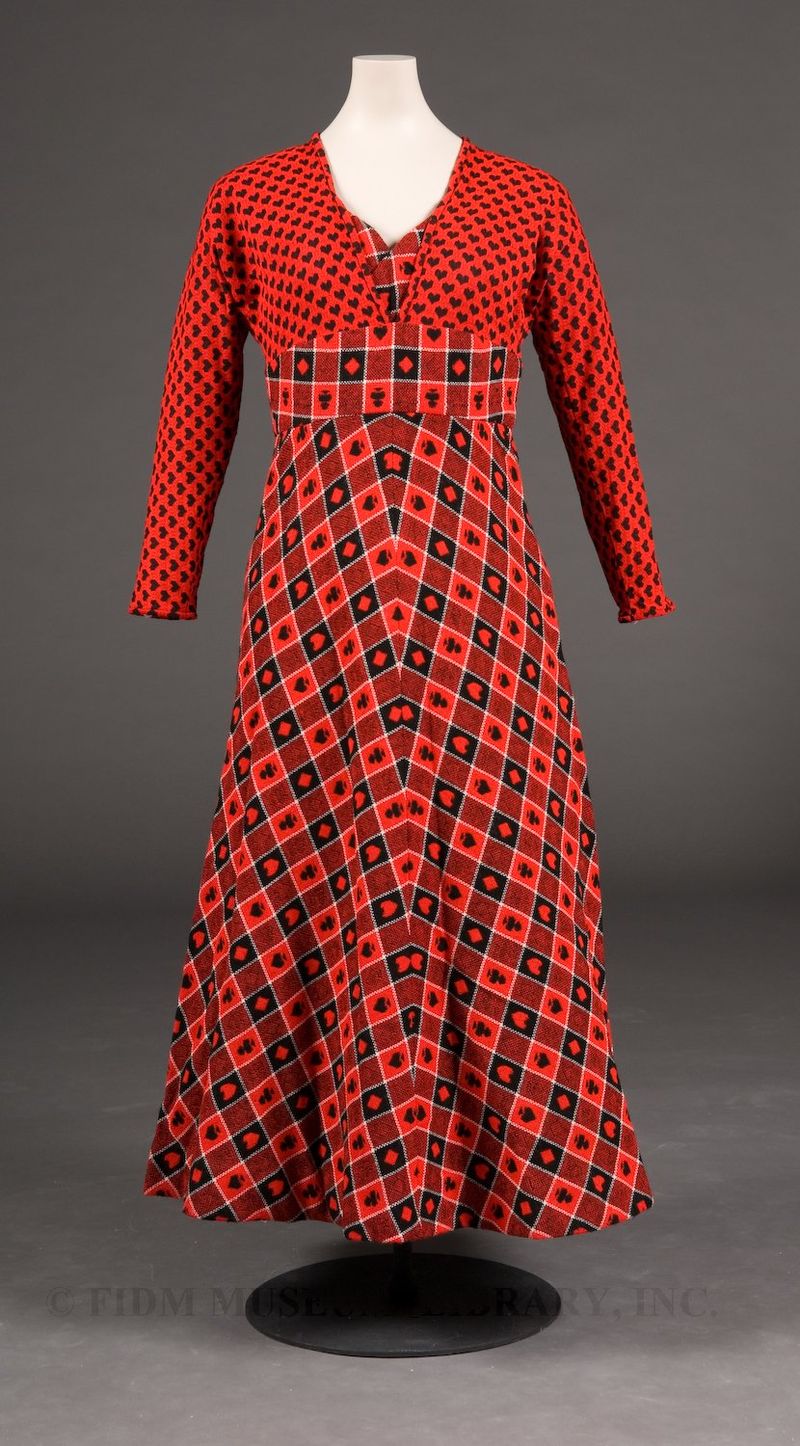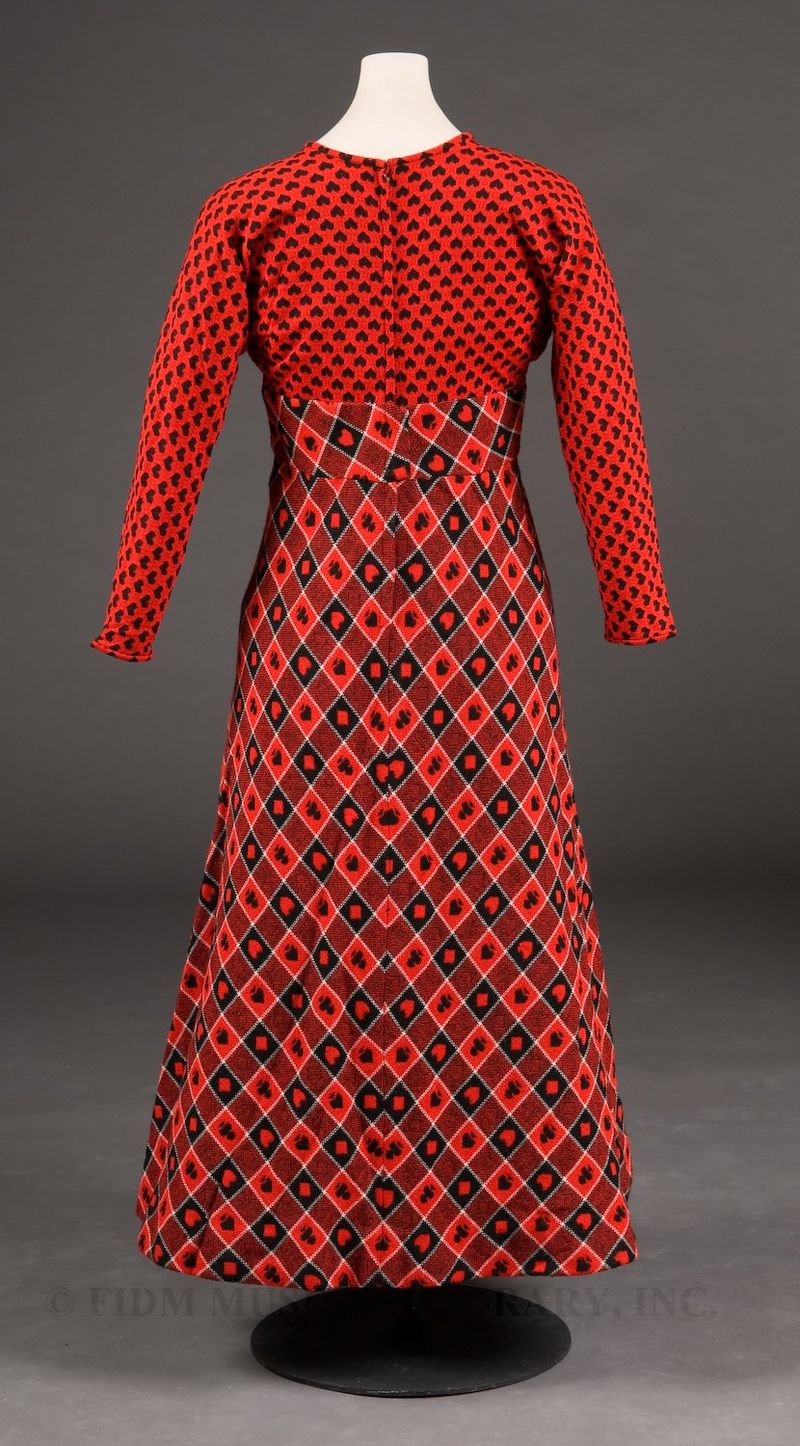The Inimitable Victor Costa
Long before he earned his reputation as "fashion's knock-off king," Victor Costa (b. 1935) created a line of Bohemian-inspired dresses—including this maxi dress wittily woven with hearts, clubs, spades, and diamonds—under the Romantica label.1
 Romantica by Victor Costa
Romantica by Victor Costa
1968-73
Gift of Melissa Manlove
2006.870.34
A career in fashion was always in the cards for Costa. Growing up in Houston's depressed Fifth Ward, where his Italian-American family owned a grocery store, he sold handmade paper doll clothes and, later, prom dresses to his classmates.2 He went on to study fashion at the Pratt Institute in New York before attending the prestigious École de la Chambre Syndicale de la Couture Parisienne. In 1958, he married his high-school sweetheart, making her wedding gown from a pattern his classmates had smuggled out of Christian Dior’s atelier.3 The following year, the couple returned to New York, where Costa continued making wedding dresses for a string of bridalwear designers. This formative experience cemented his love of feminine florals and flounces, as well as his sense of sartorial drama. "Special occasion dresses have always been my hallmark," he once confessed.4 In 1965, Costa became the in-house designer for Suzy Perette, a large New York label known for producing line-for-line copies of French haute couture. At the time, Seventh Avenue manufacturers routinely paid a "caution" of several thousand dollars to Paris couture houses, which allowed them to attend their shows, sketch their designs, and produce inexpensive copies of couture gowns, which they sold for as little as $40.5 Costa, who has a photographic memory, showed such flair for the work that he was rewarded with his own line of original designs, Romantica by Victor Costa for Suzy Perette, in 1968.6 The label grew to comprise 90 percent of the company's sales.
In 1973, the family relocated back to Texas after Costa's young daughter developed asthma. Costa saw the move as an opportunity to strike out on his own. He bought a Dallas manufacturer of plus-sized clothing and transformed it into his own label, Victor Costa. Although he continued to travel to New York frequently, he made the most of his unique status as the resident designer in a conservative, cash-flush city obsessed with dressing up.7 Costa’s taste for frilly but formal eveningwear for suited the debutantes and dowagers of Dallas well. As the city’s oil boom went bust, Costa discovered a demand for inexpensive knockoffs of high-end designers like Karl Lagerfeld, Scaasi, Bill Blass, and Christian Lacroix--men whose exuberant aesthetic mirrored his own. His fame grew as his clothes appeared on television shows like Falcon Crest, Moonlighting, and Dynasty and celebrity fans including Whitney Houston, Morgan Fairchild, Betsy Bloomingdale, and Ivana Trump.8 While his tactics were sometimes controversial--he was once thrown out of Neiman Marcus when an Oscar de la Renta rep spotted him lurking at a trunk show--Costa argued that "the word 'fashion' would not exist if there were no copying."9 Given his reputation as a gifted copycat, it's no surprise that Costa even knocked himself off, briefly reviving the Romantica label for J.C. Penney in 1994.10
1Texas Monthly, September 1987, p. 100.
2Texas Monthly, September 1987, p. 102; Women's Wear Daily, December 22, 1987.
3Richard Martin, Contemporary Fashion, 2nd edition (New York: St. James Press, 2002), p. 149; Texas Monthly, September 1987, p. 146.
4Baltimore Jewish Times, Fall 1989.
5Caroline Rennolds Milbank, New York Fashion: The Evolution of American Style (New York: Abrams, 1989), p. 220.
6Martin, Contemporary Fashion, p. 150; Women's Wear Daily, October 28, 1968.
7Texas Monthly, September 1987, p. 146.
8People, vol. 30, no. 8, August 22, 1988; Women's Wear Daily, December 22, 1987.
9People, vol. 30, no. 8, August 22, 1988; Baltimore Jewish Times, Fall 1989.
10Women's Wear Daily, September 29, 1994.
